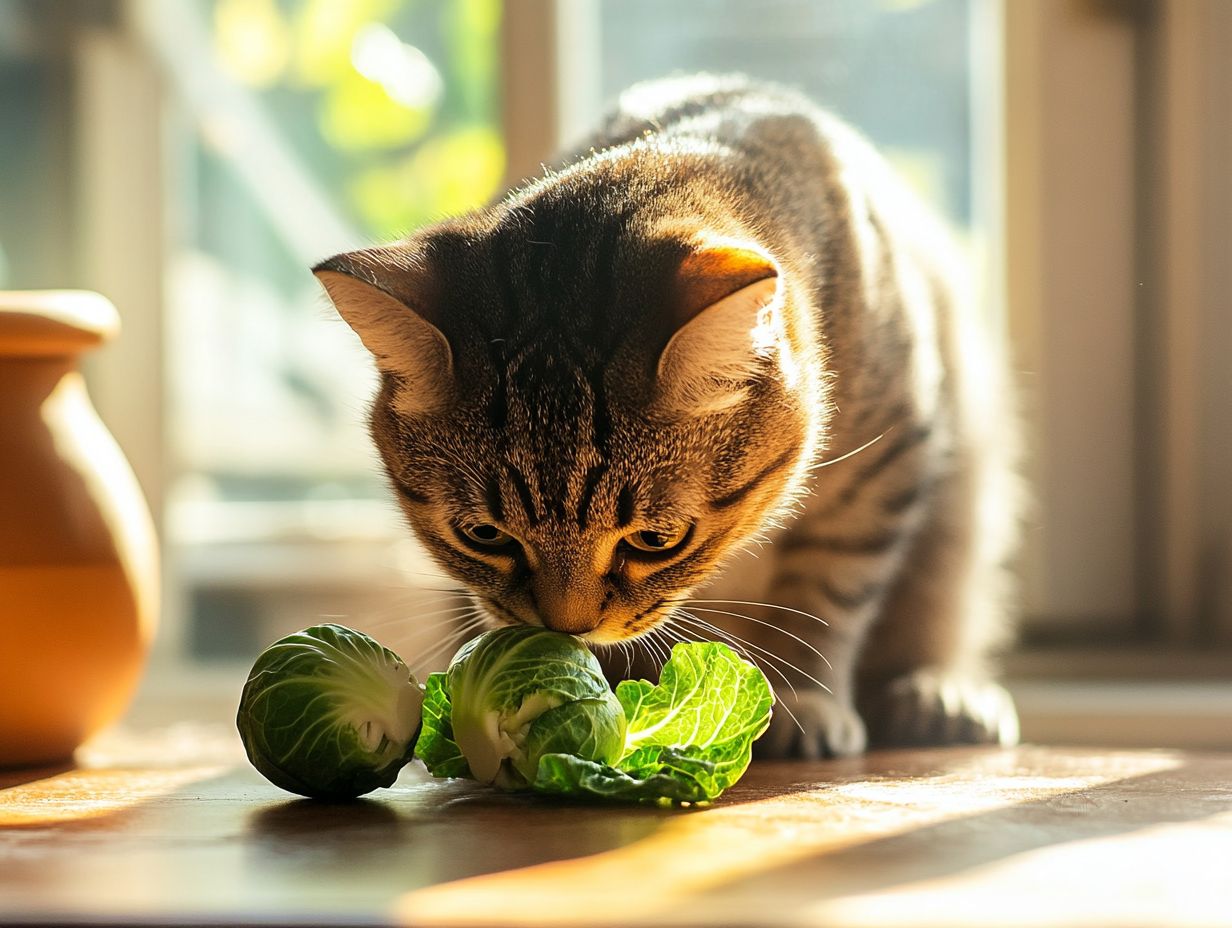Curious about whether your feline friend can munch on brussel sprouts? While cats can eat brussel sprouts, they should not be a primary component of their diet. This article will explore the details of incorporating this green veggie into your cat’s diet, emphasizing the need for consultation with a veterinarian before introducing any new food, as well as potential health benefits.
We will look at a cat’s nutritional needs, the potential benefits of brussel sprouts, and any digestive risks involved, including gastrointestinal discomfort. Additionally, we will discuss potential food allergies or sensitivities that cats may have, reinforcing the importance of monitoring for any adverse reactions when introducing new foods.
Additionally, we provide tips on safely serving them and suggest other veggie alternatives that can offer similar health benefits, reminding you that moderation is key.
Get ready to discover if these mini cabbages, known as brussel sprouts, are a fit for your kitty!
Key Takeaways:
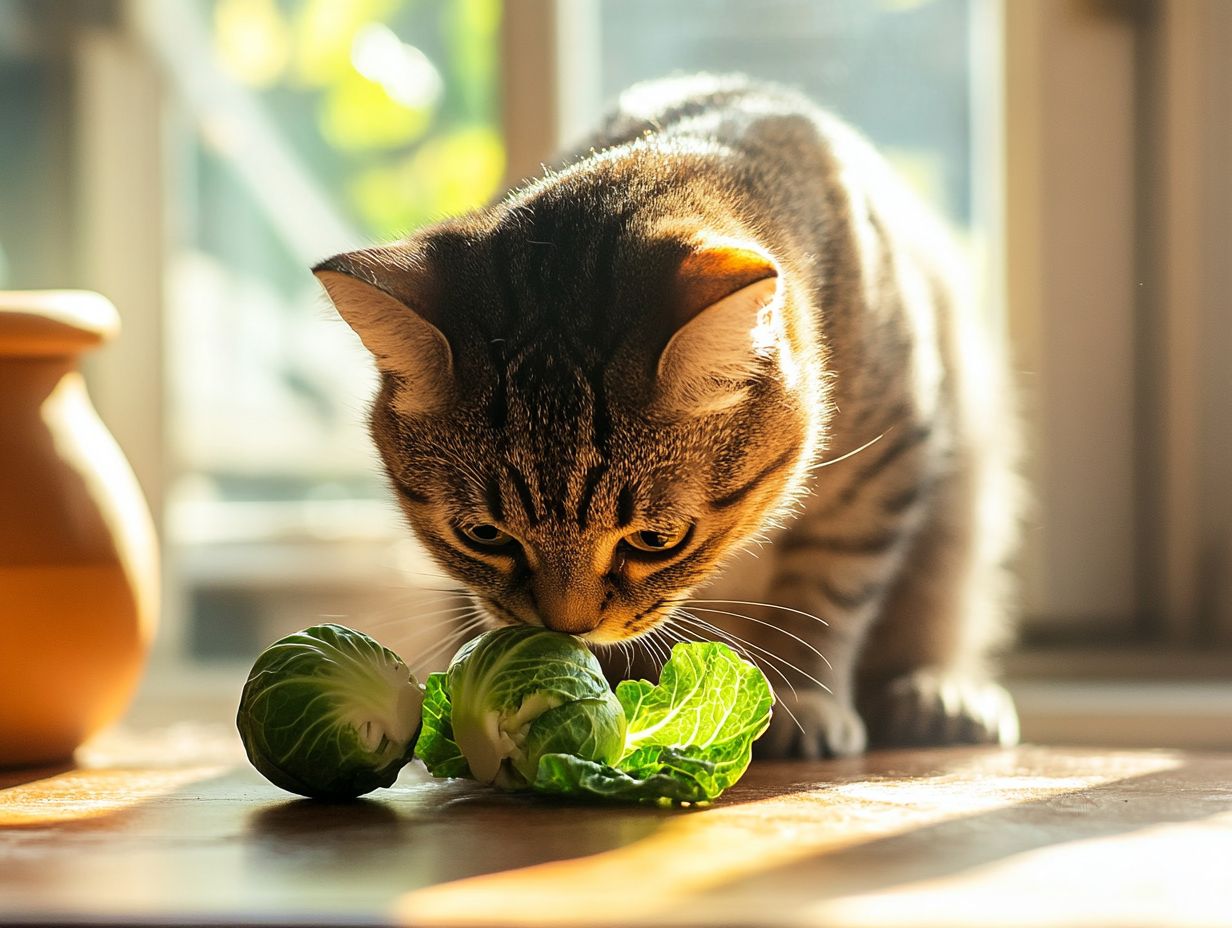
- Cats can eat brussel sprouts in moderation, but they should not be a staple in their diet.
- Brussel sprouts are a good source of vitamins and minerals for cats, such as vitamin C and potassium.
- While brussel sprouts offer potential health benefits for cats, they can also cause digestive issues if not prepared and served properly.
Can Cats Eat Brussel Sprouts?
A cat’s diet is significantly influenced by its species, and while their eating habits vary widely, they do have certain preferences. As curious creatures, it’s important for cat owners to understand whether brussel sprouts (Brassica oleracea var. gemmifera) are suitable for their feline companions.
Brussel sprouts are not harmful to cats, but their role in a cat’s diet should be considered before incorporating them. Although these vegetables offer some health benefits, they should be given in moderation to prevent potential gastrointestinal discomfort. It is advisable to consult a veterinarian, such as Dr. Linda Simon or Leslie Ingraham, for guidance on safely including these vegetables in a cat’s diet.
Understanding a Cat’s Diet
Cats are obligate carnivores, which means they primarily require meat to thrive. While cats do not require vegetables as part of their diet, small amounts can be beneficial when fed in moderation, with meat always remaining the primary component.
Well-cooked vegetables, like carrots or peas, can be advantageous, as cooking breaks down tough cell walls, making these plant fibers easier and safer for cats to digest. It is important to balance these additions and not overdo them, as cats primarily thrive on a meat-based diet.
The Nutritional Value of Brussel Sprouts for Cats
Brussel sprouts offer a nutrient profile that is rich in essential nutrients that can benefit a cat’s diet. They contain Vitamin C, Vitamin K, and Omega-3 fatty acids, all of which contribute to overall well-being.
Key Vitamins and Minerals
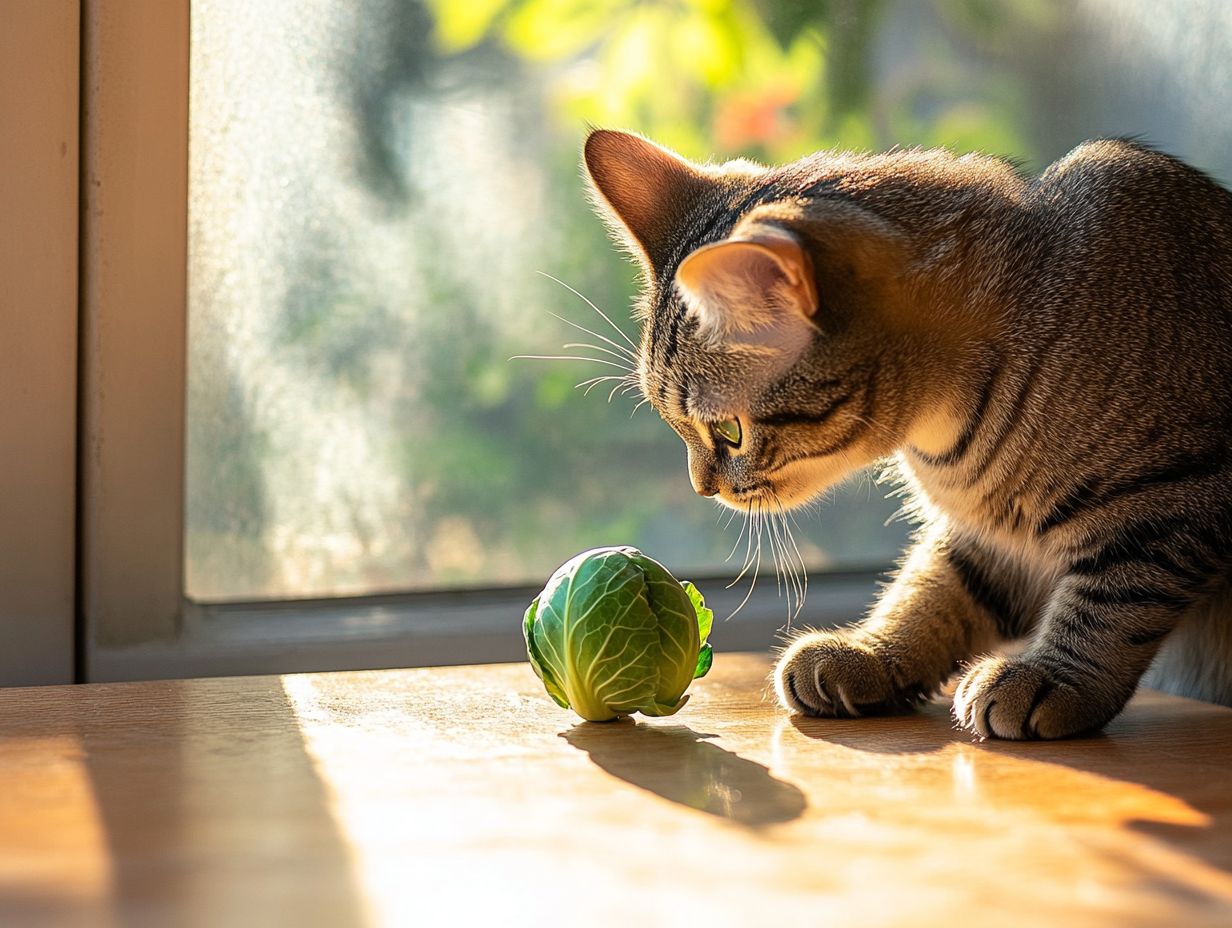
Brussel sprouts are rich in essential vitamins and minerals, particularly Vitamin C and Vitamin K, both of which are crucial for a cat’s immune system and overall health.
Vitamin C serves as an antioxidant, helping to prevent infections and reduce inflammation, which is particularly beneficial for older cats. It also plays a vital role in collagen production, necessary for maintaining healthy skin and connective tissues.
Meanwhile, Vitamin K is essential for blood coagulation, facilitating proper wound healing and preventing excessive bleeding. Including sources like brussel sprouts in a feline diet can provide these important nutrients, although they should be offered in small amounts.
It is advisable to consult with a veterinarian regarding dietary needs to ensure that cats receive a balanced diet tailored to their specific requirements.
Potential Health Benefits
Brussel sprouts can benefit cats by enhancing digestion and promoting overall health due to their high fiber content. These small leafy green vegetables support a healthy digestive system by encouraging regular bowel movements and alleviating constipation in cats. Pet owners can incorporate brussel sprouts into their cat’s diet by preparing them properly; steaming or roasting the vegetables without harmful seasonings helps preserve their nutrients and makes them easier for cats to digest.
Additionally, the antioxidants found in brussel sprouts contribute to overall health by reducing inflammation and strengthening the immune system. A safe serving suggestion is to offer about a teaspoon of cooked brussel sprouts per 10 pounds of body weight, but be cautious, as excessive amounts may lead to gastrointestinal upset, including gas or bloating. Always start with small portions and monitor closely for any adverse reactions.
Potential Risks of Feeding Brussel Sprouts to Cats
While brussel sprouts can provide some benefits, they also come with risks. Feeding too many brussel sprouts may lead to digestive issues such as gas, bloating, and diarrhea. It’s essential to watch for specific symptoms, including discomfort or changes in bowel movements, and discontinue feeding if any adverse effects occur. Always consult with a veterinarian if you are unsure about your cat’s dietary needs or if you notice any negative reactions.
In conclusion, while brussel sprouts can be a safe addition to your cat’s diet in moderation, it is crucial to consult a veterinarian, monitor for any food allergies or sensitivities, and ensure that primary nutrition comes from a meat-based diet. Remember, moderation is key!
Cats can eat brussel sprouts, but it is crucial for owners to be cautious. These vegetables should only be offered in moderation due to potential risks such as digestive problems or gastrointestinal discomfort, especially if consumed in large quantities.
Possible Digestive Issues
Feeding brussel sprouts to cats carries several risks, primarily related to potential digestive issues such as gas or bloating. The high fiber content of brussel sprouts can lead to digestive upset if cats are not accustomed to it. Therefore, pet owners should closely monitor their cats after introducing these vegetables into their diets.
Signs of discomfort may manifest as unusual behavior, frequent grooming, or a reduced appetite. It is important to recognize that, despite appearing to be a healthy option, brussel sprouts can upset a cat’s sensitive stomach.
- Introduce brussel sprouts gradually, starting with 1-2 small pieces.
- Monitor your cat’s reactions over several hours.
- If well-tolerated, you can increase the portion slightly, but maintain moderation.
Additional symptoms to watch for include diarrhea and decreased interest in usual activities, both of which may indicate an adverse reaction to these cruciferous vegetables. Moderation is essential; starting with a small amount and observing the pet’s response can help ensure a balanced and healthy diet.
How to Safely Incorporate Brussel Sprouts into a Cat’s Diet
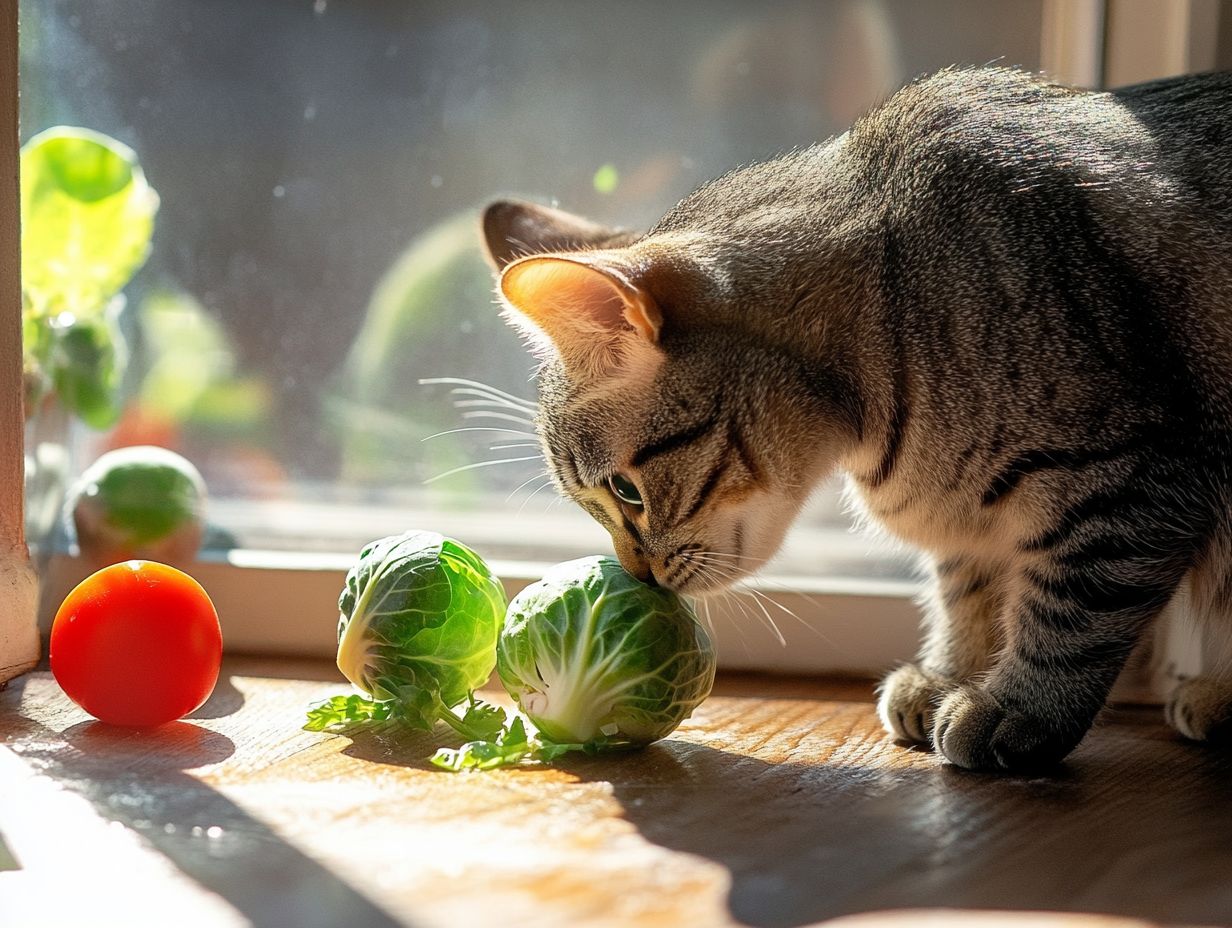
Brussel sprouts can be safely fed to cats when they are properly prepared and offered in small amounts.
Proper Preparation and Serving Suggestions
Brussel sprouts can be a safe treat for cats when served fully cooked, cut into small pieces, and free from harmful seasonings. To best preserve the nutrients in brussel sprouts, it is advisable to steam them for about 5-7 minutes or boil them for 6-8 minutes, as these cooking methods also make the vegetable easier for your cat to digest.
When introducing brussel sprouts to your cat’s diet, start with small amounts to gauge their response. If your cat enjoys them, you can incorporate them into their regular diet, but only in moderation. Too much can upset their stomach, so offering a few small pieces two or three times a week is optimal. For more information, click here to learn more about brussel sprouts and feline health.
For personalized serving suggestions that support your pet’s overall health, consult your veterinarian.
Other Safe and Nutritious Vegetables for Cats
Brussel sprouts should only be offered to cats on an occasional basis, as there are many other safe and nutritious vegetables that can provide greater variety and additional health benefits for them compared to brussel sprouts.
Alternatives to Brussel Sprouts
Some excellent alternatives to brussel sprouts for cats include:
- Carrots: Serve 1-2 small pieces, high in beta-carotene, essential for healthy vision.
- Peas: Offer 1-2 tablespoons, a good source of protein and fiber.
- Pumpkin: Serve 1-2 teaspoons, high in fiber and helps regulate digestion.
When preparing these vegetables for cats, they should be steamed or boiled without any added salt or spices to ensure they are safe and enjoyable for your feline friends.
These substitutes offer pet owners the opportunity to diversify their cat’s diet while still providing healthy options.
Frequently Asked Questions
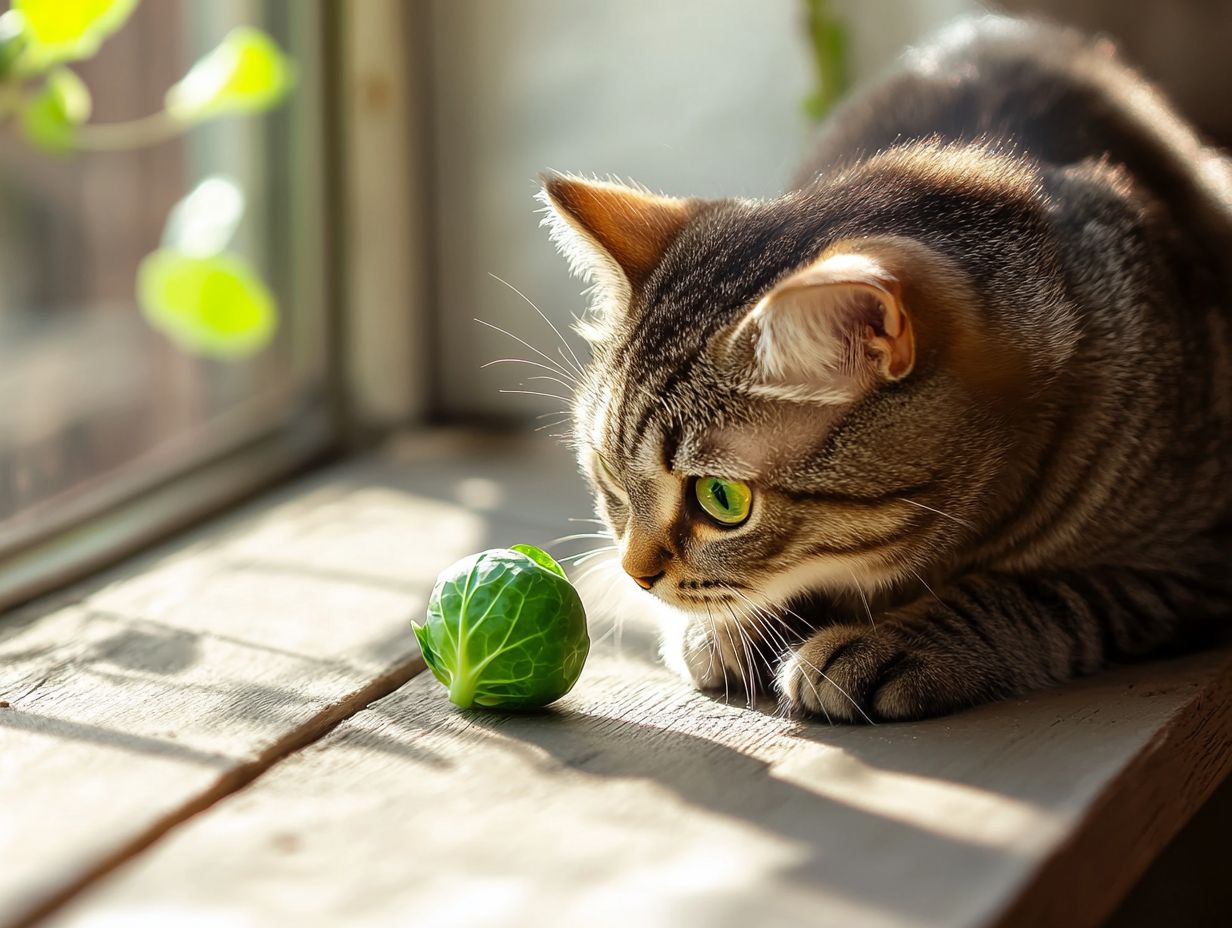
Can cats safely eat brussel sprouts?
Yes, cats can safely eat brussel sprouts in moderation. However, they should not be a regular part of their diet.
Why should I limit the amount of brussel sprouts I give my cat?
While brussel sprouts are safe for cats, they are not nutritionally beneficial for them. They do not provide any essential nutrients that cats need in their diet.
Are there any potential health risks for cats if they eat brussel sprouts?
In rare cases, cats may experience digestive upset or flatulence if they eat too many brussel sprouts. It is important to introduce them slowly and watch for any adverse reactions.
Should I cook brussel sprouts before giving them to my cat?
Yes, it is recommended to cook brussel sprouts before giving them to your cat. Raw vegetables can be difficult for cats to digest and may cause gastrointestinal issues.
Conclusion: In summary, while brussel sprouts can be offered to cats in moderation, it is essential to monitor their reactions and consult with a veterinarian before introducing new foods into their diet for optimal health and safety.
Can Cats Eat Vegetables? Understanding the Role of Brussel Sprouts in Their Diet
Many cat owners wonder if certain vegetables, like brussel sprouts, can benefit their feline friends. In this article, we will explore the nutritional benefits, potential risks, and guidelines for safely incorporating brussel sprouts into your cat’s diet.
What Nutritional Benefits Do Brussel Sprouts Offer for Cats?
Brussel sprouts contain vitamins and minerals such as vitamin C, vitamin K, folate, and potassium. Vitamin C can support immune function, while vitamin K plays a crucial role in blood clotting. However, it’s important to note that these nutrients are more readily available in other foods that are more suitable for cats, such as meat and certain fruits.
Can Brussel Sprouts Be Toxic to Cats?
No, brussel sprouts are not toxic to cats. However, they should still be given in moderation and should not make up a significant portion of their diet. While brussel sprouts are not toxic to cats, they can cause gas or digestive upset if given in large amounts. Always introduce new foods gradually and consult your veterinarian if you have concerns.
Guidelines for Feeding Brussel Sprouts to Cats
If you choose to offer brussel sprouts to your cat, start with a small portion, like one or two cooked sprouts, cut into small pieces, and observe how your cat reacts. Monitor for any digestive upset. Steam or cook brussel sprouts without added salt or seasoning to make them easier for your cat to digest, and always ensure they are cut into manageable pieces to prevent choking.
Conclusion
In summary, while brussel sprouts can be a non-toxic addition to your cat’s diet when offered in moderation, they should not replace a balanced, meat-based diet. Always consult your veterinarian before introducing new foods to ensure they are appropriate for your cat’s specific health needs.
